At Steewo Engineers, we believe understanding the differences will help our customers make the correct choices for their specific needs. Our expertise encompasses a wide range of rolling mill technologies, from hot rolling mills that form metal at high temperatures to cool rolling mills that excel in precision shaping. Whether you require the efficiency of tandem rolling mills for progressive reduction or the versatility of cluster rolling mills for processing specialty materials, we offer comprehensive solutions tailored to your specific needs.
Four Types of Rolling Mills
- Four-High Rolling Mill
A four-story rolling mill is utilized to reduce material to extremely thin layers. Roll deflection problems can be avoided and smaller work rolls can be utilized by utilizing backup rolls. The decrease in the diameter of the work roll leads to a reduction in the overall separating force and energy required for material reduction, as well as a more uniform thickness output.
- Cluster Rolling Mill
A cluster rolling mill is a unique kind of four-high rolling mill where two or more larger backup rolls capable of rolling heavy materials support each of the two operating rolls. It may be necessary to employ rolls of a very small diameter but of considerable length to achieve the desired outcome. These mills can roll hard materials like nickel alloys, titanium alloys, and stainless steel.
- Continuous Mill
A continuous rolling mill uses a sequence of rolling mills to ensure that the same amount of material passes through each stand in a predetermined amount of time. The speed must be increased proportionately if the cross-section is reduced. The speed of each set of rolls is synchronized so that the input speed of each stand is equal to the output speed of the preceding stand. In addition to feeding the stock into the rolls, the uni-coiler and wind-up reel also supply the strip with back tension from the front tension.
- Planetary Rolling Mill
This mill has a huge number of small planetary rollers surrounding a pair of massive backing rolls. The main feature of this mill is that it hot-reduces a slab to a coiled strip in a single pass. The operation requires feed rolls to introduce the slab into the mill, and a pair of planishing rolls on the exit to improve the surface finish.
Steewo Engineers is a Global dealer of rolling mills, coil processing, and tube, pipe, and metal forming equipment. We can guarantee that a customer has the appropriate machine for the work due to our experience and knowledge, which provides us a competitive advantage over others in our industry. Our team is ready to assist you with the right solution for your business. We provide professional renovation and installation services with a real focus on customer satisfaction. We have a track record of exceeding expectations in project safety, planning, scheduling, and cost control. Source URL…



